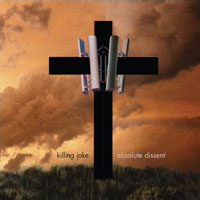
Killing Joke: “In Excelsis” (Absolute Dissent, Universal, 11/23/10)
[audio:https://alarm-magazine.com/wp-content/uploads/2010/11/Killing_Joke_In_Excelsis.mp3|titles=Killing Joke: “In Excelsis”]“If you are what you should be, you’ll set the world on fire.” – Catherine of Sienna
When Killing Joke’s Jaz Coleman and Paul Ferguson first met in 1978, they found a mutual interest in exploring the global networks of power. Rather than study political science in the conventional route of academia, the pair decided to form a band — with a ritual and manifesto designed to attract like-minded, visionary musicians.
Assuming the name Killing Joke (a phrase used by a mutual friend to describe the state of Western culture), the band’s subsequent success is proof that the plan worked. Hugely influential, with 14 albums in its discography, Killing Joke has inspired a diverse array of artists from Metallica to Primus with its blend of post-punk, new wave, and industrial. Its music acts as a veritable exorcism of the mediocrity, repression, and shortcomings of Western culture. What many in the media view as a violent streak is actually Killing Joke’s way of waking up a sleeping populace to the thin thread of sanity that keeps society from slipping over the edge.
The band’s latest album, Absolute Dissent, reunites the original lineup of Coleman (vocals/keyboards), Ferguson (drums), Kevin “Geordie” Walker (guitar), and Martin “Youth” Glover (bass). Though the band’s members have shifted over time, Walker and Coleman have remained at the core, with the mission, according to Coleman, of creating “true, contemporary Western folk music.” True to form, Coleman’s assessment of his band’s work goes against the grain: “Most bands consider their early work to be the best; I think our most valid work has come in the second half.”
Killing Joke formed during one of the most tense periods of the Cold War, and its music has always reflected the tension between the possibility of the Western world and its reality. “We’re hurtling towards disaster,” Coleman says. “The scientific community is saying that if we don’t change what we’re doing immediately, we’re going to need a new planet by 2030.” Unfortunately, as Coleman puts it, “Human beings don’t change unless they get a big jolt.” Killing Joke is that jolt, a controlled dose of the violence that surrounds us, acting to inoculate those capable of being tried by fire. Employing the maxim “the dose makes the poison” from Swiss physician/alchemist Paracelsus, the band’s violent presence is a homeopathic cure for the decline of Western society.
“I am at war with myself. I see the need for one world government, but I stand for freedom.”
Coleman points out that one of the keys to understanding the band is understanding the Western mystery tradition. Also known as Western esotericism or the Western occult tradition, the mystery tradition is a loose set of Gnostic philosophies from pre-Christian times that were gathered from Central Asia, Northern Africa, and the Mediterranean. Today, they take the form of freemasonry, Kabbalah, Hermeticism, alchemy, and various initiatory orders. When discussing Killing Joke, most of the US press is content to throw out adjectives like “dark,” “disturbing,” “violent,” and “doom-laden” without acknowledging the methods behind the imagery. Like the Siberian shamans whose initiation involves being torn apart by spirits, the band’s focus is cleansing the cultural consciousness with fire. Coleman describes it in Aristotelian terms: Killing Joke is about “catharsis.”
Over the years, Killing Joke has seen no end of controversy, from labels of Satanism and accusations of conspiracy to recent blog posts labeling Coleman as a “shape-shifter.” The band’s willingness to explore the outer edges of culture for the sake of the sacred isn’t something that’s easily swallowed by the status quo. With songs on its new album like “Here Comes the Singularity” and “The Great Cull,” it’s easy to see why a perfunctory look at the band would lead to some confusion. Challenging topics such as these make the band’s involvement in the Western mystery tradition a stumbling block for those seeking easy categorization.
At the World Futurist Society conference in 2010, global leaders gathered to discuss the speed at which advanced technology is quickly reaching a point of no return — a process that science-fiction author Vernor Vinge has termed the “technological singularity.” The positive implications like artificial intelligence, life extension, cognitive enhancement, genetic engineering, and advanced robotics are met with a darker side in decreased privacy, class conflict, and disease-based global catastrophe. But Coleman does not like to focus on fear when addressing the future. In opposition to the doom mongers, “Here Comes the Singularity” finds inspiration in these debates. While others face global catastrophe with a worried blink, Coleman is firm in his conviction: “It’s just a change; we haven’t reached the final stage of evolution yet.”
“People come to the show and see a bunch of assholes on stage who’ve done all that we’ve done, and realize, ‘If they can do it…I can too.’”
The media reacted with disdain when Coleman and Walker canceled obligations in 1982 to head to Iceland, an event that caused the breakup of the original band. According to Coleman, however, this wasn’t a holiday or a paranoid escape from the end of the world, as some have reported. Coleman and Walker were about to enact another ritual, this time intending to contact their “holy guardian angel” (or what Socrates called the “genius” — a connective consciousness to a person’s role in a unified vision of life). This ritualism, what many have mistaken as political consciousness, is better understood as a sacred call to purify the soul of the West from centuries of slow decline.
“Life is the location of your gift, and the development of it,” Coleman says. “We were all really angry when we were younger, feeling outside of everything. Killing Joke’s given us the opportunity to find our path and supported us the whole way.”
It’s a cruel irony that shortly after the death of Coleman’s close friend, longtime Killing Joke bassist Paul Raven, conspiracy blogger Chris Knowles of The Secret Sun launched a series of accusations alleging Coleman’s untoward involvement in an occult conspiracy against Raven. On Absolute Dissent, this friendship is brought to the fore in the song “The Raven King,” an apotheosis (a raising to divinity) for Raven’s spirit in which he becomes the symbol of freedom and brotherhood. Coleman’s lyrics speak to his deep respect for ancestral spirits, and his belief that death is not the end but that something lives on: “Forever in this moment / Rejecting those who would control us / Touched by a common genius / All bound by fate and common purpose.”
For all his showmanship, Coleman couldn’t be further from the malevolent force that he’s so often accused of being. He lives an austere life with few possessions and enjoys spending time on his land in New Zealand when he can. “I stopped all ritual work in 1989,” he admits, “and even then, it was always about devotion for me.” At the time, he sought to achieve the “healing magic of the ancients” as a means to cleanse the collective conscious. He expounded on this concept in a 1987 lecture at the Courtauld Institute of Art in the UK, where he noted, “Central to this very old form of therapy is the idea that if you suffer from the underworld, you can only be cured in the underworld.”
Reunited with the same purpose, Killing Joke uses Absolute Dissent as a curative to the lax lifestyles and lazy intellectualism that penetrates culture. It’s absolute dissent from expectations, the status quo, and the fear-mongering diatribes that are abundant on all sides of the debate. As such, it’s a very personal album with global overtones. Frenetic guitar that’s set to a pounding rhythm sends the listener into the title track — a vibrant rejection of the current state of affairs — with a solemn promise: “I won’t repent.”
Even when the music pitches into brutal revelation, it concurrently suggests heroic return. The listener is bounced between a corporate industrial apocalypse and Killing Joke’s assertions. On “Honour the Fire,” Coleman sings, “The fire that drives us overcomes all pain / And all of our struggles never been in vain.” Beyond the reflection on a broken social system, a sense of overcoming struggle and the power of working together is the primary thread that runs throughout the album.
This outlook helps declare that Absolute Dissent is more than just another conspiracy-laden Infowars accompaniment. Though the band often touches on conspiracy topics such as the New World Order — a theory that everyone from the Catholic Church to the Freemasons are out to take over the world — it calls for action and responsibility rather than paranoia. On the album’s fifth track, “European Super State,” Coleman uses the topic not to warn of puppet masters but to discuss the possibilities of large-scale government. During the song, Coleman sings, “A blue flag, gold star sparks a brand new empire / Ours to build, ours the choice / I’m in a European Super State / Every citizen required to debate.”
With this, Killing Joke reminds us that the choice is ours, and that the future is what we make of it. On stage in Chicago in late 2010, Coleman remarked, “I am at war with myself. I see the need for one world government, but I stand for freedom. When barely one percent of the population can understand the complex issues of the day, democracy is quite finished.”
Coleman thus advocates the renewal of nature and equal debate, and his answer is simple. A proponent of permaculture, he foresees eco-villages set up to be self-reliant and feels that bands should use their influence to spread these ideals of equality. “Picture it: a cafe/art gallery, with bands playing every night, outside a farmers market selling locally grown food,” he says.
What started with two men on a quest to find the workings of global power has lead to a 32-year journey that has opened up far beyond the band’s beginnings. “The gathering” is a term that Walker created to reference the people who feel a kinship towards the band’s members. What others may see as a fan club, Killing Joke sees as allies in a battle to reclaim the soul of humanity. “We call it the mirror effect in Killing Joke,” Coleman says. “People come to the show and see a bunch of assholes on stage who’ve done all that we’ve done, and realize, ‘If they can do it…I can too.’” Now, with the original members united again, and the bonds of brotherhood having weathered the years, Killing Joke is more potent than ever. If Absolute Dissent is any sign of things to come, we’ve yet to see the full potential of the band’s vision.

